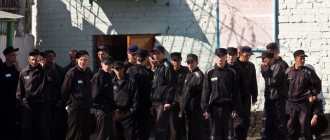Colony-settlement: conditions of detention, features of the regime, norms of the Criminal Code of the Russian Federation
The measures of influence required to correct the behavior of various criminals are differentiated based on the severity of the consequences of the embodied offense and the presence of intent in the actions that led to negative results.
In a situation where the living environment of a subject convicted by a sentence of a judicial authority is not favorable enough and can provoke a violation of the law during the period of a conditional form of perception of punishment, a method of influence is needed that can protect from a negative environment, but is not accompanied by significant restrictions.
It is in such situations that the justice body makes a decision to choose not just a prison, but a colony-settlement, as a place of execution of retribution in the form of deprivation of personal freedom.
General information
For those individuals who have committed a crime of minor gravity or become criminals against their will, without malicious intent or motives for causing harm to others, isolation among more vicious and embittered individuals is not acceptable. Often such individuals repent of what they did, but the combination of circumstances does not always allow the use of a conditional conviction or relief from actual punishment.
In this case, an artificial environment is required that imitates the structure of a real society, but has a limited area and is staffed with observers monitoring compliance with behavioral norms.
Such an environment makes it possible to determine the possibility of resocialization of a convicted individual without more stringent correctional procedures, his desire and possibility of peaceful coexistence with others and providing for his needs by legal means.
The following video explains what a colony settlement is:
What it is?
A type of correctional institution of the Federal Penitentiary Service, located mainly in wooded areas of the northern and eastern regions of Russia and representing buildings without fences, is called a colony-settlement.
Neglect of the protected perimeter is compensated by the remoteness of such settlements from cities and other significant settlements, representing mining cooperatives engaged primarily in felling and logging.
The colony itself is remote from the populated area associated with the logging industry, but the distance is not great and serves to nominally delimit the territory of the convict settlement.
As an element of the system of correction of criminals, settlement colonies provide the mining industry with cheap labor, since not many people agree to voluntary alienation from civilization and usually for significant monetary motivation.
Convicted individuals, who are ordered to appear in a colony to carry out punishment against them, do not have a choice, and the need to earn money with their own labor and compulsory service forces them to find employment on conditions favorable to the employer. Read below about what kind of colony-settlements there are and whether there are women’s ones.
Types of such institutions
Colonial settlements are divided into institutions for two types of prisoners, namely:
- those who committed crimes due to circumstances, through negligence or with intent, but the consequences were not above average severity;
- those sentenced to punishment in the form of correction in a colony with a strict or general regime and who, by their exemplary behavior, deserved a mitigation of the punishment.
The organizational form of colony-settlements does not change when the population serving a sentence changes, and the division itself is conditional and aims to distinguish subjects with more profound defects in the behavioral model from less malicious offenders. The next section will tell about who is serving their sentence in penal colonies.
For whom are they intended?
As a measure to correct the behavior of a criminal, a colony-settlement can be assigned if the act was not intentional, entirely due to a combination of circumstances or in defense of one’s own interests, that is, by definition, it was not intentional. People who did not intend to harm anyone's interests, in most cases, regret the consequences and the punishment towards them should be nominal, only to confirm the possibility of social coexistence.
Individuals who have committed crimes with moderate or mild consequences can be returned as full-fledged members of society after minor correction and demonstrative demonstration to them that issues can be resolved without resorting to illegal actions.
The progressive system for correcting criminal behavior patterns provides for a gradual easing of the measure of influence and an expansion of the list of privileges if the convicted person shows himself properly and demonstrates correction.
It is the colony-settlement, not counting release, that is the most attractive way of serving a sentence for prisoners from general and strict regime colonies, since it is essentially free living with minor restrictions.
Peculiarities of execution of punishment in colony settlements
The punishment, when a colony-settlement is designated as a place of serving imprisonment, is nominal in nature and is more reminiscent of a long shift at a logging plant. Restrictions on rights and freedoms take the form of testing the convicted person’s ability to function normally, without antisocial behavior or going beyond what is permitted.
Some settlers, especially those who were transferred from general or strict regime colonies, do not perceive the settlement colony as a place of isolation, due to the lack of a fenced perimeter and paramilitary guards, and willfully leave it. However, the remoteness of the settlements from large populated areas, along with the limited number of plying vehicles, complicates escapes and facilitates the search for regime violators.
Read below about the features and regime of detention in the settlement colony.
Modes
There is no formal division of the conditions of stay in a colony-settlement into regimes, however, violators of regulated norms of behavior may be subject to a ban on leaving the hostel outside working hours for up to one month.
- A dormitory is the usual form of accommodation for prisoners sentenced to serve their sentences in settlements, however, family individuals who have proven themselves well can rent housing within the boundaries of a colony or an adjacent settlement, thereby falling under the definition of a light regime of detention.
- When living outside the premises of a colony-settlement, convicted persons are required to appear at the checkpoint at least 4 times within a month and not allow behavior contrary to the rules.
How to transfer a convicted person closer to his family?
September 28, 2020
Adviсe
On September 29, amendments to the Criminal Executive Code come into force: at the request of a convicted person or his relatives, he can be sent to a correctional institution on the territory of the subject of the Russian Federation where his relatives live
The right of a person to serve his sentence on the territory of the subject of the Russian Federation in which he lived or was convicted was enshrined in the Criminal Executive Code from the moment of its adoption. However, the subject of the Russian Federation in which a person is convicted does not always coincide with the place of residence of his family. Therefore, when determining the place to serve a sentence, FSIN employees have a wide range of options, and the choice of one of them is often determined not only by objective, but also by subjective factors, including the negative attitude of the administration towards the convicted person.
In the absence of circumstances that form a special attitude of the administration towards the convicted person, the issue is resolved simply: if he or his relatives timely submit an application with reference to Art. 73 of the Penal Code of the Russian Federation and a description of difficult family circumstances in the pre-trial detention center and the Federal Penitentiary Service of the subject of the Federation in which the pre-trial detention center is located, the FSIN body sends the convict to the colony closest to the place of residence of his family. Here, for the FSIN employees, it will be important that the person knows Art. 73 of the Criminal Code of the Russian Federation and refers to it, so it must be indicated.
At the same time, not everyone knows about this possibility, so convicts often end up in institutions that are difficult for relatives to visit due to their remoteness. If a person has already been transferred to the place of serving his sentence, his transfer according to the general rule defined by Part 1 of Art. 81 of the Penal Code of the Russian Federation is not yet possible, since, according to this norm, the convicted person is obliged to serve his sentence in one institution for the entire term.
Conveyance of convicts
Those convicted in criminal cases are subject to distribution to correctional institutions, according to the measure of responsibility applied to them.
Until the court verdict comes into force or the documents are being appealed, the convicted persons are kept in pre-trial detention center.
They cannot stay in the isolation ward all the time; it is always overcrowded. Therefore, from time to time, convicts are transported to prisons.
In criminal law, this process is called the transfer of convicts. How the transfer from the pre-trial detention center to the colony occurs, and what requirements employees of executive institutions must comply with, we will talk further.
What is a stage in prison?
Conveyance is the forced transportation of convicts in criminal cases to colonies, prisons, and camps . This stage involves the entire journey of the convicted person from leaving the pre-trial detention center to arriving at the colony.
On this path, the prisoner will experience many new experiences: from long journeys in stuffy, windowless compartments to futile attempts to transport all his property at once.
The decision to transfer a convicted person to a specific colony is made by the management of the pre-trial detention center.
But before this, the pre-trial detention center receives an order from the central department of the Federal Penitentiary Service in Moscow, which indicates which colonies and how many places there are for convicts.
Due to the fact that in many colonies they serve time only for certain types of crimes, the distribution of convicts by pre-trial detention center employees is not an easy task.
In what situations is staging required?
In a broad sense, a stage is the path of a convicted person from point A to point B. And this path is not always associated with departure to a colony.
There are other situations in which a convicted person must be transported:
- Delivery of a convicted person to court who is in a pre-trial detention center under a decision to select a preventive measure in the form of detention.
- Delivery of a convicted person to court, where a new criminal case has been filed against him, if he is already serving a sentence for another crime in a colony. It often happens that a convicted person is sitting, for example, in a prison in Tatarstan, and a new criminal case against him is received at the court site in the Chelyabinsk region. In this case, the judge issues a transfer order and sends it to another region. Sometimes you have to wait months for someone to be convicted.
- Delivery of a convicted person to court for a decision to add sentences when the convicted person is already serving time in a colony for one of the crimes committed.
- Moving convicts from one colony to another in the event of emergencies, fires or riots.
One way or another, the penal system is always associated with various movements of convicts around the country . Our country is huge, which is why convicts sometimes travel for weeks or months.
How long the stage lasts is difficult to answer unequivocally. It all depends on the distance of the colony from the pre-trial detention center.
How to prepare for the stage?
The exact time of transfer to the convict is not reported. Before departure, the cell is visited by an employee of the detention center, who calls the name and surname of the convicted person who must serve.
It is better to start preparing for the stage immediately after the verdict comes into force.
So, recommendations for preparing for the stage are as follows:
- Pack your things and food for the trip in advance. The convicted person has the right to take with him a bag weighing up to 50 kg. The main products that you will need on the road are tea and coffee, sugar and condensed milk, and instant noodles. On commuter trains transporting convicts, only boiling water will be served.
- It is better not to take bales that are too heavy for lifting, since at the end of the route in the new colony the convict will be given a heavy mattress. At the same time, you are given only one attempt to deliver your own belongings.
- According to the stage, it is better to settle in those carriages where one of the convicts’ acquaintances is present. All convicts are transported together without division into articles. Therefore, a convict sentenced to six months in prison can travel with a dangerous repeat offender.
- It is not recommended to eat or drink a lot before the stage. This is due to the fact that opportunities to go to the toilet will be strictly limited along the way.
- It is not recommended to take large quantities of SIM cards and cigarettes with you.
- Be sure to take a first aid kit with antibiotics and anti-inflammatory drugs.










